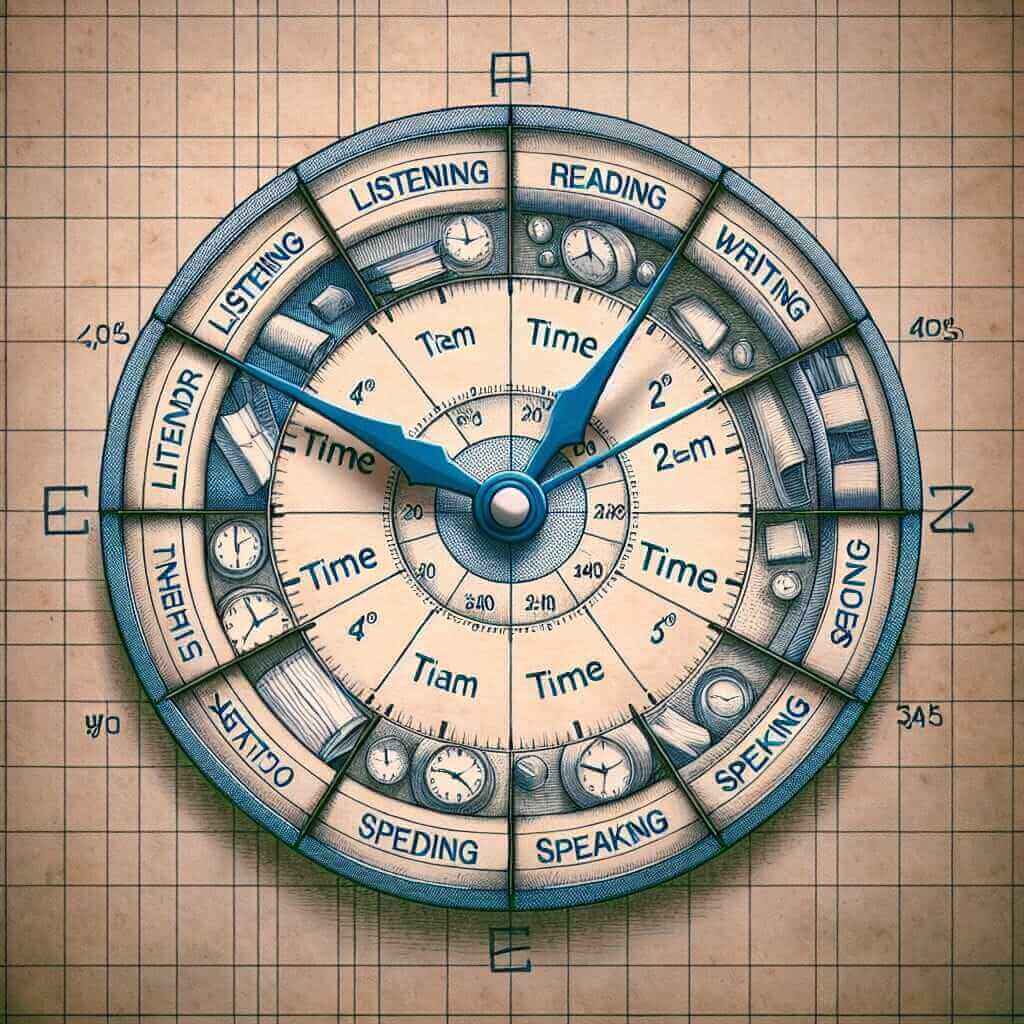Time management is crucial for success in any exam, and the IELTS is no exception. With its strict time limits and multi-faceted structure, efficient time allocation is essential to maximize your score. This article provides a comprehensive guide to mastering time management in the IELTS exam, empowering you to navigate each section confidently and achieve your desired results.
Understanding Time Constraints in IELTS
The IELTS exam is divided into four sections, each with its own time limit:
- Listening: 30 minutes (40 questions)
- Reading: 60 minutes (40 questions)
- Writing: 60 minutes (2 tasks)
- Speaking: 11-14 minutes (3 parts)
Understanding these constraints is the first step towards effective time management. It’s important to note that you need to complete all questions within the allocated time, without any extensions.
Effective Strategies for Each Section
Listening
-
Utilize the breaks: The recording is played only once, but there are pauses between sections and 30 seconds to review your answers at the end. Use these wisely to preview upcoming questions and double-check your responses.
- Example: During the 30-second break after Section 2, quickly skim through the questions in Section 3 to get an idea of the topic and question types.
-
Focus on keywords: Train your ear to pick out keywords related to names, dates, places, and numbers. These are often crucial for answering questions accurately.
- Example: In a conversation about travel arrangements, pay close attention to keywords like “departure date,” “flight number,” and “hotel address.”
Reading
-
Skim and scan effectively: Don’t read every word; instead, skim for the main idea of each paragraph and scan for specific information related to the questions.
- Example: For questions asking for specific details, use keywords from the question to locate the relevant information in the passage quickly.
-
Allocate time wisely: Divide the 60 minutes equally among the three reading passages, aiming to complete each within 20 minutes. This ensures you have sufficient time for all sections.
- Example: Set a timer for 20 minutes per passage and stick to it. If you’re struggling with a particular question, move on and return to it later if time permits.
Writing
-
Plan your essays: Before you start writing, spend a few minutes brainstorming ideas and structuring your essays. This will save you time and ensure a more coherent and well-organized response.
- Example: For Task 2, jot down your main arguments, supporting ideas, and a possible structure for your essay before you begin writing.
-
Practice time-bound writing: Regularly practice writing essays within the time limit to develop speed and fluency. Aim to complete Task 1 in 20 minutes and Task 2 in 40 minutes.
- Example: Choose a past IELTS Writing Task 2 question and try to write a complete essay response in 40 minutes, ensuring you address all parts of the task.
Speaking
-
Think while you listen: During the examiner’s questions, actively listen and formulate your response in your head. This will minimize pauses and help you deliver a more fluent and natural response.
- Example: If the examiner asks about your hobbies, use the time while they are speaking to recall specific examples and details you can share.
-
Expand on your answers: Avoid giving one-word or very short answers. Elaborate on your points and provide examples to demonstrate your language skills.
- Example: Instead of just saying “I enjoy reading,” elaborate by mentioning your favorite genres, authors, or the last book you enjoyed.
Common Time Management Mistakes and How to Avoid Them
- Spending too much time on a single question: Learn to recognize when you’re stuck and move on. You can always return to the question later if time allows.
- Rushing through the easier questions: Even if a question seems easy, allocate sufficient time to read it carefully and provide an accurate response.
- Panicking about the clock: Constantly checking the time can increase anxiety and negatively impact your performance. Trust in your preparation and focus on the tasks at hand.

Practicing Time Management for IELTS Success
The key to mastering time management in the IELTS exam is consistent practice. Familiarize yourself with the test format, time limits, and question types. Utilize practice tests under timed conditions to simulate the real exam environment and identify areas where you need to improve your pace.
Conclusion
Efficient time management is an invaluable skill for excelling in the IELTS exam. By understanding the time constraints, implementing effective strategies for each section, and avoiding common pitfalls, you can approach the test with confidence and maximize your chances of achieving your target score. Remember, consistent practice and developing a strategic approach to time allocation are key to unlocking your full potential in the IELTS exam. Good luck!